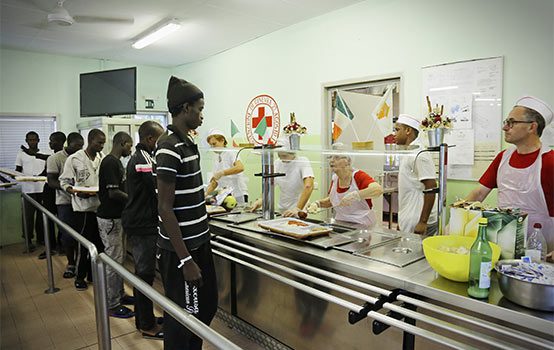Africa’s Migration Problem

Security directors from a number of North and East African countries have been discussing the issues raised by the continued flow across their borders of immigrants seeking to reach Europe. The numbers are expected to decline as colder weather arrives, but not as much as in previous years, and the migration is expected to surge again in the spring. Several countries that have become transit points report that the immigrants are coming from as far as the Republic of South Africa, reflecting the economic problems that prevail in much of the continent. Libya continues to be the favored launching point for boats taking the immigrants to Italy, Greece, and even the Balkans, primarily due to the unsettled conditions prevailing in the western part of that country.
Officials note that the migrants create problems all along their routes to the north as they are transiting through relatively poor countries with little in the way of resources to mitigate the difficulties presented by their long journeys. They are also exploited, and even killed, by the people-smugglers that infest the most commonly used routes.
The North and East African governments in question mostly blame the surge taking place over the past two years on European Union policies, which have failed to confront the human tidal wave in any realistic way and are lately being described as “humanitarian” in nature even though the would-be immigrants from Africa are only rarely victims of unrest or civil war. They are instead overwhelmingly young males seeking work and opportunities for a better life. When interviewed by the authorities, they almost all cite the belief that if they reach Italy or Greece they will eventually be able to stay in Europe. Many know that Rome and Athens are willing to put up with them temporarily but will ultimately try to influence them to move on to northern Europe, which suits the migrants perfectly. Many are indeed escaping camps set up to process their applications for asylum or refugee status and are heading north. The word going back to their friends at home is that Europe is now wide open, and it is time to take the initiative, even as some individual nations in Eastern Europe are trying to close the door.
 (The flow of would-be refugees out of Syria is, of course, something quite different, but it also includes many non-humanitarian cases, who, like the Africans, destroy their identity documents to make categorizing them and evaluating their status more difficult.)
(The flow of would-be refugees out of Syria is, of course, something quite different, but it also includes many non-humanitarian cases, who, like the Africans, destroy their identity documents to make categorizing them and evaluating their status more difficult.)
The North African governments would like to see firm measures to deal with their refugee problem, with the European Union tightening up on its policies and refusing to take in new immigrants and instead returning them to their points of embarkation, which are mostly on the Libyan coast. They believe that once the escape route is closed at its end point, it will also close at all points down the line, which would appear to be a sensible argument. But Europe is dithering, eager to appear to be doing the right thing for world opinion, yet actually making the problem worse by creating an incentive for people to move.
Philip Giraldi, a former CIA officer, is executive director of the Council for the National Interest.
Comments